|
64a Harbour Parade (Hotel)
62 Harbour Parade (Tap)
Ramsgate
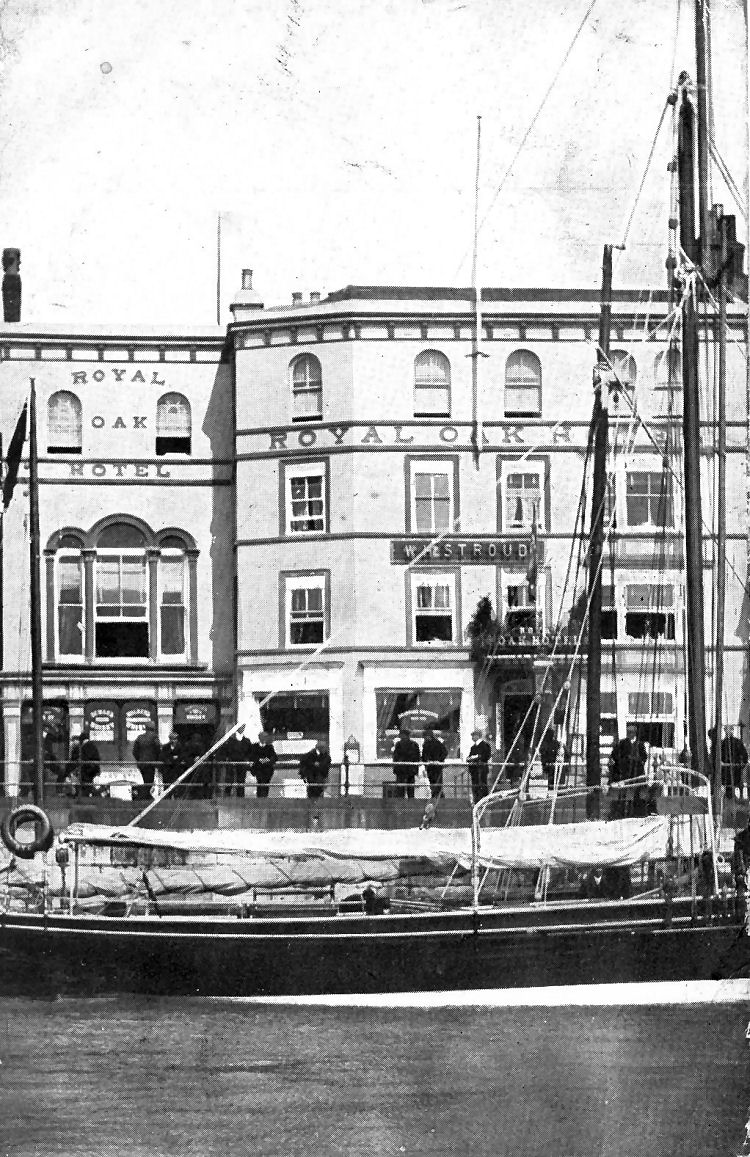
Above photo 1930s, kindly sent by Michael Mirams. |
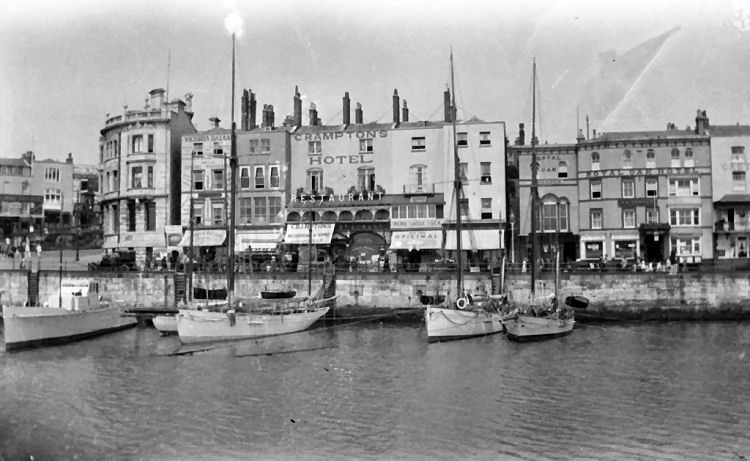
Above photo, circa 1920s, kindly sent by Gerry Bigland. |
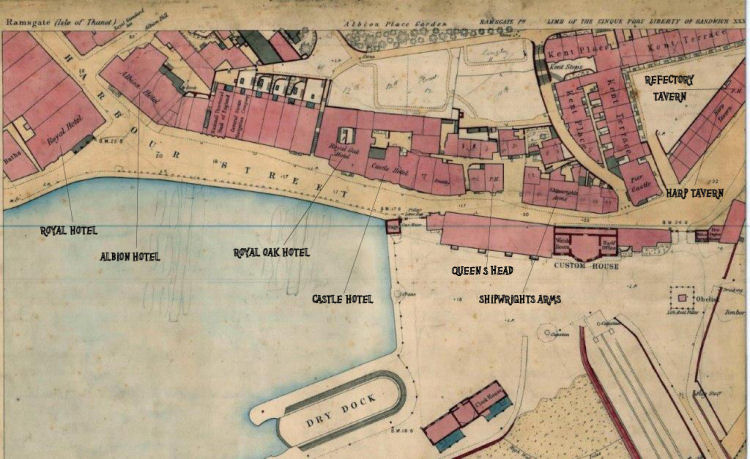
Above map, 1849, kindly sent by Bob Lee. |
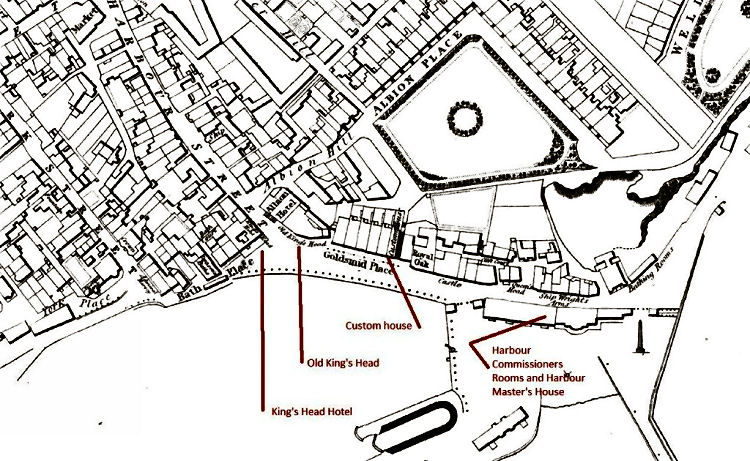
Above map,1872, kindly supplied and annotated by Bob Lee. |
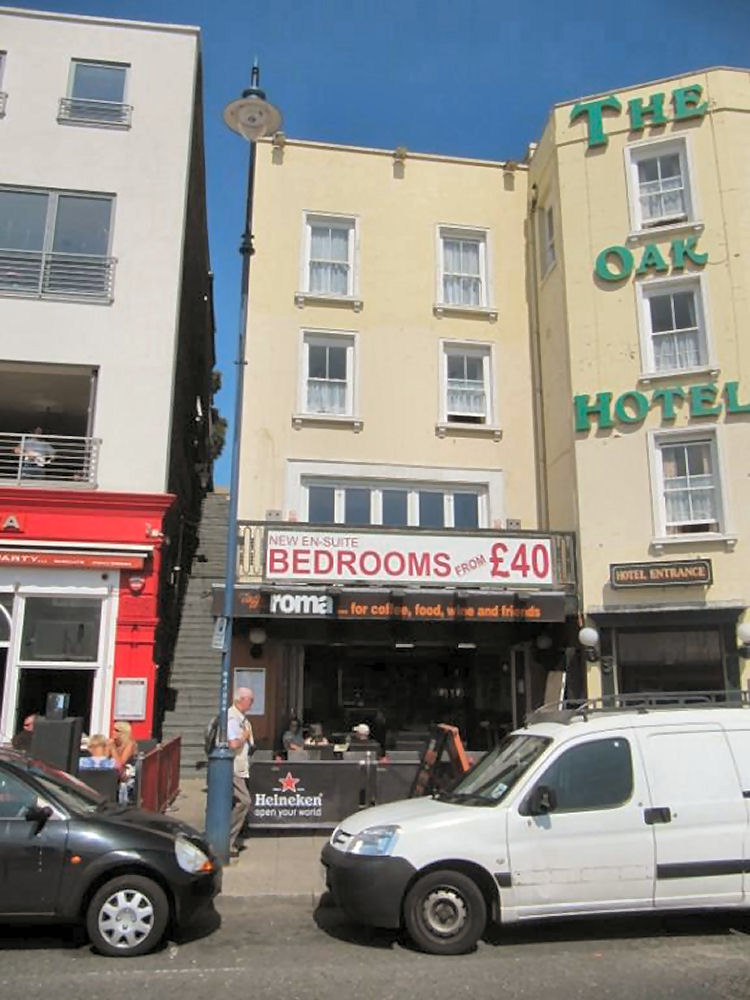
Above photo, date unknown by Darkstar. |
The pub dates from c.1690, and was quaintly styled Oak At The Waterside
in the rate book of 1717. The tavern stood right at the water's edge before
the construction of the Royal Harbour. It was greatly enlarged in the 1820s
when it had stables, coach house and office, knife house and herring hang.
I have reference in 1779 after the auction of the buildings and land
belonging to recently deceased brewer John Hooper that the house had
recently changed name to the "Ship and Pilot."
It must have changed back though or never actually changed name officially.
|
From the Kentish Gazette, 24 July 1779.
TO BE SOLD BY AUCTION.
At the "Red Lion" in Ramsgate on Friday the twentieth Day of August
next, about five o'clock in the Afternoon (if not sold before by private
Contract, of which public Notice will be given) the under mentioned
Freehold Estates, in the following Lots, viz.
LOT 7. All that commodious and modern built Messuage or Tenement, late
heretofore known by the Sign of the "Royal Oak," and now by the Sign of
the "Ship and Pilot," with all the Appurtenances thereof, situate at the
Pier or Harbour in Ramsgate, being very fit, both as to Structure and
Situation, for a good public or private House.
|
|
Kentish Gazette, 5 September 1820.
DIED.
August 31, at Ramsgate, after a long protracted illness, which bore
with great fortitude and resignation, Mr. John
Cramp, of the "Royal Oak Inn," aged 51 years.
|
|
Kentish Chronicle, 21 April, 1829.
A coroner's inquest was held on Monday se'nnight at the "Royal Oak,"
Ramsgate, before Valentile
Hotel, esq., Coroner of Sandwich, on the body of John Flaxman, one
of the blockade seamen of
Pegwell Battery station, who, on the night of Saturday, deliberately
shot himself through the heart. It
appeared by the evidence of Mr. E. Oldy, that on the night in
question he went to relieve the
deceased, then on duty in their Jacob's Ladder; that immediately
after leaving witness to return to the
station, he heard the report of a pistol, and, on turning round saw
deceased fall. Flaxman had lately
been discharged as an Officers servant, on a charge of drunkenness,
and sent on duty at the station;
and on the night he committed the fatal act was again intoxicated;
and it is supposed dreading
punishment was the cause of his depriving himself of assistance.
The Coroner, after a minute investigation, returned the verdict of -
Temporary Derangement.
|
|
From the Kent Herald, 14 November 1833
Ramsgate.
An inquest was held on Thursday last at the "Royal Oak Inn," before W.
W. Bradley, Esq., Coroner on the body of a man named Bayley, who was
found drowned in the Royal Harbour the proceeding day.
It appeared that the deceased of formerly been in opulent circumstances.
There being no evidence before the Jury as to the manner of his death,
they returned a verdict of "Found Drowned."
|
|
From the Kentish Gazette, 25 April 1843.
On Thursday week the Commissioners of Salvage sat at the "Royal Oak,"
Ramsgate, to adjudicate claims on the "Admiral Van Heenshirt," which has
been on the Margate sands, and they agreed to award £1,500 to the
Margate boatmen. Also on the "Grace Darling," laden with stone, from
Goole, she having lost her mainmast; when the Commissioners awarded £50
to the boatmen who assisted her into harbour.
|
|
Southeastern Gazette, 13 September 1853.
Nicholls v. Merryweather, proprietor of the "Royal Albion Hotel,"
for selling wines. The same witnesses proved the case. The defence
in this case was that the party who was supplied with the wine went
into a private room, and the waiter supplied the wine thinking they
were guests of the occupants of the rooms.
Fined 15s. and 14s. costs.
At this stage of the proceedings Mr. Child suggested that as they
did not press for penalties, they were willing to withdraw the
informations upon the several defendants paying the costs incurred.
The following persons were then mulcted in 5s. 6d. each:—
Wm. Hudson, "Bull and George Hotel;" James Corben, "Royal Oak;"
Thomas Parnell, "Admiral Harvey;" Charles Brittain, the "Mitre;"
Charles Page, the "Woodman;" George Holmes, "Trafalgar Hotel;" Henry
Simmons, "Lord Nelson;" George Mussared, "Spread Eagle;" Richard Butler, "Cinque Ports Arms."
|
|
Kentish Gazette 6 December 1853.
South Eastern Gazette Gazette, 6 December 1853.
DEATHS. CORBIN.
Nov. 29, Mr. James Corbin, landlord of the "Royal Oak Tavern,"
Royal Harbour, Ramsgate, aged 34 years.
|
|
From the Borough of Greenwich Free Press, 23
April, 1859.
THE RAMSGATE MURDER. RAMSGATE, Saturday.
By the exertions of the police sufficient light has been thrown
upon this sad occurrence to lead the belief that it is a case not of
murder but of deliberate suicide. It will seem from what follows,
that the object of the deceased was to conceal his identity, and
this would explain almost all the mysterious circumstances connected
with the case.
The deceased landed at Southampton at the end of March from
America, and went to the "Hotel de L'Europe," in that town. He there
gave a name which sounded like "Maitinger." He left Southampton for
London on the 31st of March, and there put up at "Hahn's Hotel,"
America-square. where he remained till the 7th of April. He wore his
left hand in a bondage, and said it had been injured on board ship.
On leaving the house he stated that he was a German, travelling for
pleasure, and that he intended to make the tour of Scotland before
returning to Germany, but must first go to Paris. The people of the
hotel believed him to be a native either of Baden or Wurtemberg.
During his stay he appeared perfectly rational, but on an occasion
when asked to write an address card he said he would do it at once,
as his memory had been very had since he suffered so severely from
brain fever in America. On the 7th of April he left by the South
Eastern Railway for Dover, and as has been already stated, in the
same carriage with Mr. S. Kidd. It has been said that Mr. Kidd
noticed two of the deceased’s finders to be wanting. The fact was,
however, that Mr. Kidd only observed that the fingers were bandaged
— that is to say, concealed, as they were at the hotel in London. On
the 8th, the deceased bought the hatchet at Mr. Green s shop at
Dover, as described, and stated himself to be a Russian. There is
now no doubt that he was a German.
On the same day he went from Dover to Deal by omnibus, and while
on the wav the deceased being the only inside passenger, a German
Bible was thrown or dropped outside the omnibus, and was picked up
by a travelling hawker, who sold it at the "Swingate
Inn" adjoining. The Bible has been examined by the police, and
contains no name or marks. The motive of deceased in getting rid of
it was probably because the possession of the book would have
pointed out the country to which he belonged, and thus have given a
clue to his Identity, for from this time the deceased always
declared himself to be a Russian.
On arriving at Deal the deceased went to the "Walmer
Castle Inn," stayed there on Friday night, and on Saturday came
from Deal to Ramsgate by train. On arriving At Ramsgate he had his
beard and moustaches shaved off. He then put up at the "Royal
Oak." While there, a gentleman in the coffee-room addressed
him in French and in German but he shook his head saying, "Me Russ,
me Russ." On Sunday he visited Margate, as already described, and
after dining at the "Elephant
and Castle" went to the house of Braiser. He then went for a
walk with his carpet-bag under his arm, and returned to the railway
without it. The bag was found near Westbrook empty, and near it two
shirts and a white handkerchief with the marks picked out. He
returned to Ramsgate the same afternoon, and at half-past five
o'clock entered an oyster shop, where he partook of some
refreshment. At a quarter to seven he was at the inn at Broadstairs,
and at a quarter past seven he was seen near Sir Moses Montefiore’s
wall upon the cliff. At a quarter past eight a man whose clothes and
hat (the latter of large size and peculiar shape) exactly resembled
those of the deceased, was seen by a young man named Jackson at the
eastern end of the Parade on Mount Albin. The man walked rapidly,
with his arms folded and his eyes fixed on the ground. Here all
trace of the deceased is lost till he was found at six o'clock next
morning, dead, under the East Cliff.
The following are among the circumstances which point most
directly to suicide. The spot where the body was found was
twenty-five feet from the cliff, and the tide had risen some feet
above it, high enough to have washed the body to the place where it
lay. About eighty yards lower down the beach in nearly a direct
line, cuts were found in one of the chalk rock exactly corresponding
with the blade of the hatchet found close by. The rock would be
covered as soon as the water rose above half flood. Now half flood
on Monday morning was about half-past one o'clock, and the death
consequently took place between a quarter-past eight and half-past
one. The rick is as high as a chair, so that a man might easily have
knelt beside it, placed his fingers upon it, and chopped them off.
The hatchet, fingers, boots, and umbrella (the articles moat likely
to sink) were found near this latter spot, while the clothes were
found among the seaweed near the body, It is stated by experienced
boatman that if the deceased add chopped off his fingers at the rock
alluded to, and had then stabbed himself to the heart and fallen
instantly dead, his body would have been washed by the regular set
of the rising tide right in shore, and a little to the northward, or
exactly to the place where, in point of fact, the body was found.
The knife, which has been searched for without success would
probably have been knocked out of the wound by the body washing
against the low rocks, and if the knife had a wooden handle, as many
sailors' knives have it might have floated and been carried out to
sea. The medical evidence was that that the skin was frayed, which
would have resulted from the body washing up the beach.
Why, It may be asked, did the deceased chop off his fingers? The
answer is, for the same reason that he had previously bandaged them,
viz., to conceal his identity. One joint of the first finger and two
joints of the second had been amputated some years age, and were
perfectly healed. By this mark the deceased would be recognised, and
therefore he determined to take all his fingers off. There was no
sign of disease or other injury upon his hand to requires a bandage.
The absence of his watch and ring is now easily accounted for. Both
being of peculiar appearance, and likely to lead to his
identification, he would destroy them. If there was a name written
inside his boots, to cut off the tops would effectually get rid of
it. The wristbands of the shirts were torn off and the marks picked
out with a similar object. The unfortunate man, however, forgot a
scrap of paper which was found near the body in the storehouse. and
which there is no reason to doubt belonged to the deceased. It
contained these words, written in pencil in indifferent German:—
"Dear Mother, here are five dollars — little, but from a good heart.
Henry Mattereigh.
The fact that the deceased's money was gone has led many persons
to believe that a murder had been committed. Now, when the body was
found the tide was two hours ebb, and long before that time country
carta may have gone down to the beach, as in frequently the case,
for gravel, or persons may have been, as one was known to be,
looking for shells. It is not improbable that the deceased was
robbed after death. The pockets of his coat were turned inside out
and two front pockets in his angola shirt were ripped open. We may
add that it is very doubtful whether the deceased had so much money
as has been represented. The few words addressed to his mother led
to the belief that be was poor. His cloth es were scanty, much worn,
and of the coarsest description. He never paid in gold, always in
silver and his watch was silver and not gold, as has been stated.
Had the unfortunate man been murdered there are three ways by
which the body must have been carried to the beach, viz., past the
harbour, where police are stationed all night, down Augusta stairs,
where a coastguard is stationed, or by Dumpton stairs, where there
is another guard. To suppose that the man was murdered on the beach
is contrary to all the evidence to suppose that he was carried down
past the guard is nearly incredible; or indeed that it should have
been attempted, when the body might so much more easily have been
dropped over the cliff.
The facts point, we think, clearly to the conclusion that the
deceased returned from America a disappointed man, reduced in means,
and that this circumstance, affecting a brain previously weakened by
disease, led him to determine on suicide. At first intending to send
his mother some little money, he changed his mind, and endeavoured
by the means we have described to do away with all trace of his
identity, and thus lead his family to the belief that he had
perished at sea or in a foreign land.
Melancholy as such a solution of the mystery is it in some
satisfaction to know that what at first appeared an atrocious murder
can be thus explained. No circumstance that has happened for many
years has created so deep a sensation in East Kent as this shocking
affair.
At the adjourned inquest held on Wednesday the jury found the
following verdict:- "That deceased died from a wound in the left
breast, but by whom it was inflicted there is not sufficient
evidence to show."
|
|
From the Kentish Chronicle, 6 April, 1861.
RAMSGATE.
The Churchwardens' dinner took place on Tuesday, at Mrs. Corbin’s, the
“Royal Oak Inn.” It was well attended, and the dinner, which comprised
every delicacy of the season, was served up in a style which reflected
the highest credit on the establishment of the worthy hostess, and
excited the warm commendation of the guests.
|
|
Thanet Times, Tuesday 2 June, 1964.
Oswald Charles, Champion of the trade.
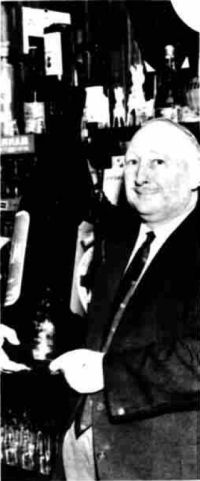
Mr. Oswald Charles, of the "Royal Oak Hotel," on Ramsgate
seafront, is in his second year as president of the Isle of Thanet
Licensed Victuallers' Association and was previously vice president
for 2 years and secretary for 3 years. He is also social secretary
and this year has been honoured by becoming president of the Woman's
Auxiliary League. He is a committee member of the Licensed Trade
Convalescent Home as well.
Mr. Charles has been at the "Royal Oak" since July 1958, and was
previously at the "Dug Out," Margate, for 6 years. For two years he
had both houses before selling the "Dug Out" in 1960.
Mr. Charles served in the army from 1939 to 1947, in the Royal
Engineers, was commissioned in the port branch of the regiment,
ending in service as a staff captain.
From 1947 to 1949 he was stationed in Germany with the foreigner
office, and during the war had charge of the battalion messing. When
a war-time dock strike was on in London he was in charge of catering
for troops who were brought in.
Seafaring family.
"I have been connected with shipping most of my life, coming from
a seafaring family from Liverpool," said Mr. Charles, who moved to
Margate in 1952. He has been a keen sportsman, playing for the Army
at football, for Liverpool at badminton, and he ran twice in a
Manchester to Blackpool relay race.
"All licences should be members of their Trade Association and,
if possible, take an active part," he says. "The licensed trade as a
wonderful life which he and his wife do all they can to enhance, and
at present he is putting all his spare time into trade and charity
affairs.
|
Later, the "Royal Oak" was the only Watney's tied house in Thanet, I
believe the premises must have reverted back to the "Royal Oak" again, later
in life, I do know it
re-opened as the "Royal Oak and Shades Hotel" in 1982.
LICENSEE LIST
CRAMP John to 31/Aug/1820 dec'd
CRAMP Ann 1823-39+

CORBIN James 1839-Dec/53 dec'd
CORBIN Charlotte Mrs 1855-81+ (widow age 58 in 1881 ) )

CORBIN Henry Edward 1890-1903 (manager age 25 in 1871 ) )
CARDEN Joseph John 1903+

STROUD William Henry 1907-18+
WINKLE Alfred 1930+
BURROW Bernard B 1934+
HAMES Robert 1936-38+
 CHARLES Oswald July/1958-64+
CHARLES Oswald July/1958-64+
https://pubwiki.co.uk/RoyalOakShades.shtml
http://www.closedpubs.co.uk/royaloakshades.html
Royal Oak Tap.
STOCKLEY/STACKLEY Simon 1841+ (age 47 in 1841 ) )
SMITH John 1867-71+ (also shipwright age 46 in 1871 ) )
HUGHES Robert 1881+ (age 47 in 1881 Royal Oak Tap)
Royal Oak Tap)
DANTON James M 1890-91+
CARDEN Joseph 1901+
 From the Pigot's Directory 1828-29 From the Pigot's Directory 1828-29
 From
the Kelly's Directory 1903 From
the Kelly's Directory 1903
 Kentish
Chronicle Kentish
Chronicle
 Census Census
|





